| Srl | Item |
| 1 |
ID:
117813
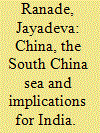

|
|
|
| 2 |
ID:
111881


|
|
|
|
|
| Publication |
2012.
|
| Summary/Abstract |
Conventional wisdom seems to hold that under Barack Obama, the US ballistic missile defence programme has been pushed aside to allow for a refreshed domestic and international agenda. Proponents point to Obama's campaign thinking and rhetoric, the ballistic missile defence (BMD) budget cuts, the decision to end the Third Site in Europe, and the reset relations with Russia through the New Strategic Arms Reduction Treaty (New START) as evidence that the programme has undergone a significant period of change, retraction and rationalisation. This article argues instead that BMD has not fallen from prominence and that there is a change in focus rather than retraction of its strategic goal. Consequently, BMD continues to grow in importance as a component of US national security strategy.
|
|
|
|
|
|
|
|
|
|
|
|
|
|
|
|
| 3 |
ID:
188451
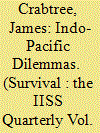

|
|
|
|
|
| Summary/Abstract |
The United States intends to manage China’s rise by forging a new balancing coalition of ‘like-minded’ partners and by developing deeper ties with other nations in the Indo-Pacific that view themselves as broadly non-aligned. Washington hopes that closer ties to the US and its partners will stop such countries from drifting towards China. But to create these deeper relationships, the non-aligned group also needs reassurance that attempts by the like-minded partners to integrate capabilities and fashion a new regional balance of power will not tip the Indo-Pacific towards conflict. Like-minded nations will need to appreciate the risks that security initiatives like the Quad and AUKUS are perceived to create, realise that Hanoi or Jakarta is unlikely to embrace Canberra’s or Tokyo’s vision of the region’s future warmly, and be willing to make substantial material investments. Tension between integration and reassurance will inevitably endure.
|
|
|
|
|
|
|
|
|
|
|
|
|
|
|
|
| 4 |
ID:
117974
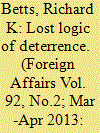

|
|
|
|
|
| Publication |
2013.
|
| Summary/Abstract |
For half a century, deterrence was the backbone of U.S. national security strategy. But now, Washington doesn't seem to know how and when to use it properly. The United States has needlessly applied deterrence to Russia, failed to apply it when it should have against Iraq and Iran, and been dangerously confused about whether to apply it to China. U.S. policymakers need to relearn the basics of deterrence in order to apply it successfully in the appropriate circumstances.
|
|
|
|
|
|
|
|
|
|
|
|
|
|
|
|
| 5 |
ID:
098659
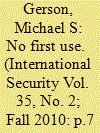

|
|
|
|
|
| Publication |
2010.
|
| Summary/Abstract |
The release of the Barack Obama administration's much-anticipated Nuclear Posture Review (NPR) concluded an intense, yearlong effort to revamp U.S. nuclear weapons policy to better address modern threats. Despite general agreement that the United States' nuclear policy and posture was in need of overhaul, there were strong disagreements over what kinds of changes should be made. At the core of these debates was the issue of U.S. declaratory policy-the stated role and purpose of U.S. nuclear weapons. Whereas some members of the administration advocated that the United States retain all of the flexibility and options afforded by the policy of calculated ambiguity, others contended that to fulfill President Obama's commitment to "put an end to Cold War thinking" and "reduce the role of nuclear weapons in U.S. national security strategy," the United States should adopt a more restrictive nuclear policy such as no first use (NFU), perhaps in the form of a declaration that the "sole purpose" of U.S. nuclear weapons is to deter a nuclear attack. By not adopting NFU, the NPR missed an important opportunity to reduce the role of nuclear weapons in U.S. strategy. The traditional case for NFU hinges on the argument that the threat of nuclear first use is unnecessary for deterrence. Yet the continued U.S. option to use nuclear weapons first is not only unnecessary but dangerous. Given the size and accuracy of the current U.S. nuclear arsenal, and given the variation in the nuclear capabilities of current and potential adversaries, the first-use option risks creating instabilities in a severe crisis that increase the chances of accidental, unauthorized, or deliberate nuclear use. In a future crisis with a nuclear-armed state, the fear-whether real or imagined-that the United States might attempt a disarming nuclear first-strike increases the possibility of nuclear escalation.
|
|
|
|
|
|
|
|
|
|
|
|
|
|
|
|
| 6 |
ID:
096987
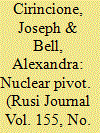

|
|
|
| 7 |
ID:
148326
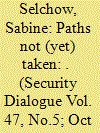

|
|
|
|
|
| Summary/Abstract |
While it is Ulrich Beck’s concept of ‘risk society’ that has mostly attracted attention in the field of security studies, in this article I argue that if we want to take Beck seriously, we need to go beyond his ‘risk society’ thesis and acknowledge that his main thesis was that we live in a social reality that is qualitatively new and, consequently, calls for a radical shift in how we look at and talk about it. To bring Beck into security studies, then, means to study ‘security’ from within Beck’s ‘new world’. For that, I argue, a sharper conception of what characterizes that world is needed. At the heart of my article I provide such a conception – the ‘cosmopolitized world’ – which I identify as being shaped by non-linearity and the interplay of two moments: the ‘cosmopolitized reality’ and the ‘tradition of the national perspective’. Building on this concept and experimenting with it, I turn to reading the ‘US national security’ discourse as this is constructed in the text of the 2015 National Security Strategy from within this ‘cosmopolitized world’. Reflecting on this experiment, I conclude by highlighting the potential that bringing Beck in this way into security studies holds, as well as pointing to the need for future work on the vocabulary of the ‘cosmopolitized world’.
|
|
|
|
|
|
|
|
|
|
|
|
|
|
|
|
| 8 |
ID:
121975
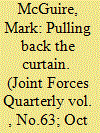

|
|
|
| 9 |
ID:
115780
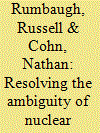

|
|
|
| 10 |
ID:
103116
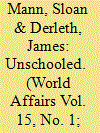

|
|
|